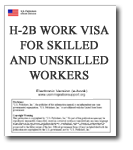
On September 19, 2024, USCIS announced that it has received enough petitions to reach the congressionally mandated cap on H-2B visas for the first half of FY2025. September 18 was the final receipt date for new cap-subject H-2B worker petitions requesting an employment start date before April 1, 2025. USCIS will reject new cap-subject H-2B petitions they receive after September 18 that request an employment start date before April 1, 2025.
Client Reviews

Know Their Job Well And Perform It Flawlessly
“Don’t do the mistake we did and try to save few bucks going with nonprofessionals and sole practitioners! It will end up not only costing you much more in the long run, but also putting your status in jeopardy which can have a priceless impact. It is one of the most important steps in your life.”
- Sgt. Danny Lightfoot, Los Angeles, California
Read More Reviews
Zoom Consultations Available!
The H-2B Visas page is divided into the following subtopics:
- H2B Visa Resources
- Labor Certification
- Dependents
- Guides to Studying in the U.S.
- H2B Visa – Additional Resources
H2B Visa Resources
- Foreign Countries Whose Nationals Are Eligible to Participate in the H-2A and H-2B Programs (11-9-23)
- Cap Reached for Additional Returning Worker H-2B Visas for the Early Second Half of FY 2023 (3-31-23)
- DHS Announces Countries Eligible for H2A and H2B Visa Programs (11-9-22)
- DHS Announces Countries Eligible for H2A and H2B Visa Programs (1-12-21)
- USCIS: H-2B Petitioners Must Include Temporary Labor Certification Final Determination with Form I-129 (7-30-19)
- USCIS Reaches H-2B Cap for Fiscal Year 2017 (2-20-17)
- Labor Department Immigration Resources
- USCIS: H-2B Temporary Non-Agricultural Workers
- USCIS Reaches H-2B Cap for Fiscal Year 2015 (4-2-15)
Labor Certification
The first step to obtaining an H2B visa for a worker from outside the U.S. is for the employer to apply for a temporary labor certification with the Department of Labor. These certificates are designed to assure that the admission of aliens to work in this country on a temporary basis will not adversely affect the job opportunities, wages, or working conditions of U.S. workers. The employer is required to file the labor certification with the I-129 petition. For specific procedures on filing, please visit the Department of Labor’s Employment and Training Administration.
Dependents
Dependents (spouses and unmarried children under 21 years of age) of H-2 workers are entitled to H-4 status with the same restrictions as the principal. Dependents may not be employed under the H-4 classification.
Including more than One Workers in a Petition
A single petition may cover multiple workers if:
- they will perform the same services
- they will work in the same location
- they are included on the same labor certification and,
- they come from places that are served by the same U.S. consulate, or, if visa exempt, they will enter at the same port of entry.
It is not necessary to identify requested H-2A beneficiaries by name (unless only a single worker is needed) if they are unnamed on the underlying labor certification. H2B visa beneficiaries must be named unless circumstances (e.g. emergencies) make identification by name impossible. The number of unnamed beneficiaries must always be stated on the petition.
H-2B Skilled or Unskilled Workers
The H-2B classification applies to an alien coming temporarily to engage in non-agricultural employment which is seasonal or intermittent, to meet a peak load need, or to participate in a one-time occurrence.
Petition Document Requirements
Before filing this petition the U.S. employer must first apply for a labor certification from the Department of Labor to demonstrate that U.S. workers are not available and that wages and working conditions meet regional standards. The U.S. employer should file the petition with:
- Either an original single valid temporary labor certification from the Department of Labor (or the Governor of Guam if the proposed employment is solely in Guam), indicating that qualified U.S. workers are not available and that employment of the alien will not adversely affect the wages and working conditions of similarly employed U.S. workers; or
- An original notice from such authority that such certification cannot be made, along with evidence of the unavailability of U.S. workers and of the prevailing wage rate for the occupation in the U.S, and evidence overcoming each reason why the certification was not granted; and
- Copies of evidence, such as employment letters and training certificates, that each named alien meets the minimum job requirements stated in the certification.
